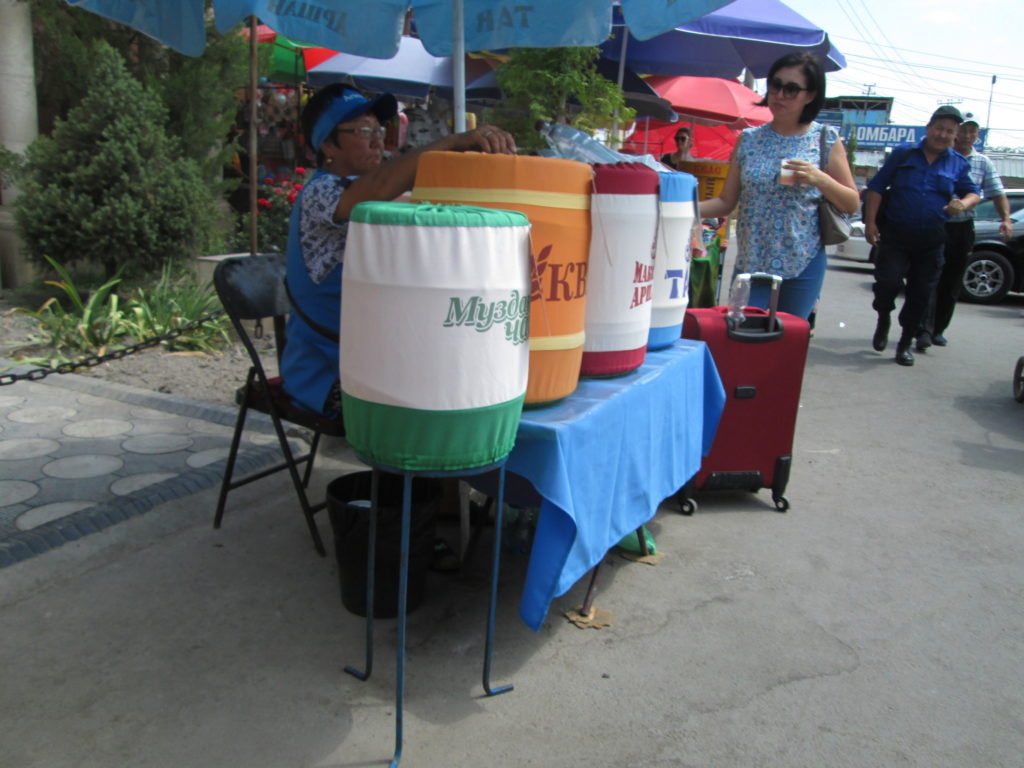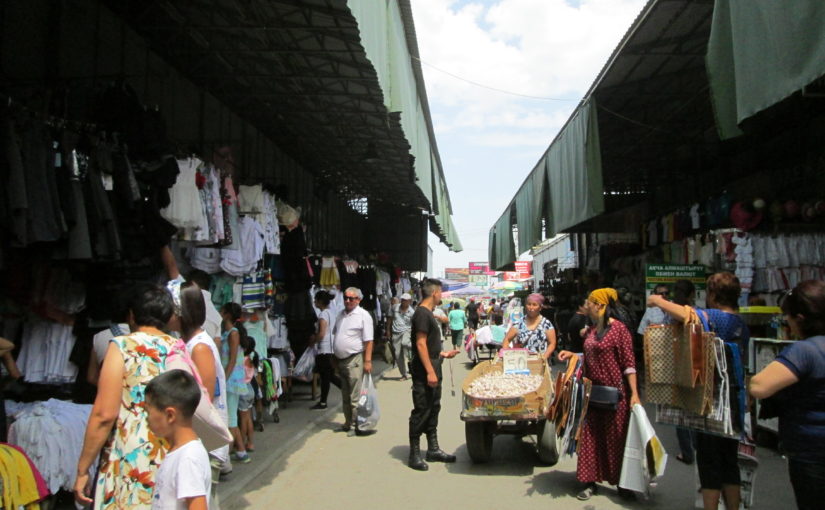My first bazaar experience was on my third weekend in Bishkek. I went with an American friend who had been to several other Asian countries before and had experience shopping at a bazaar. We went to Osh Bazaar, one of the largest bazaars in Bishkek and the best bazaar for buying souvenirs and national goods. As we wandered around the bazaar, in order to avoid unwanted attention, we spoke quietly in English. It was a refreshing break from speaking Russian so often with my host family and language partners. The biggest benefit of going with another English-speaker was that we could help each other understand the vendors: two heads are better than one. For instance, I was better at numbers, but she had a better general vocabulary. Together we were able to tackle prices, clothing sizes, styles, materials, colors, and so on as we shopped for national clothes and souvenirs. Also, shout-out to my friend if she is reading this — I had a great time!
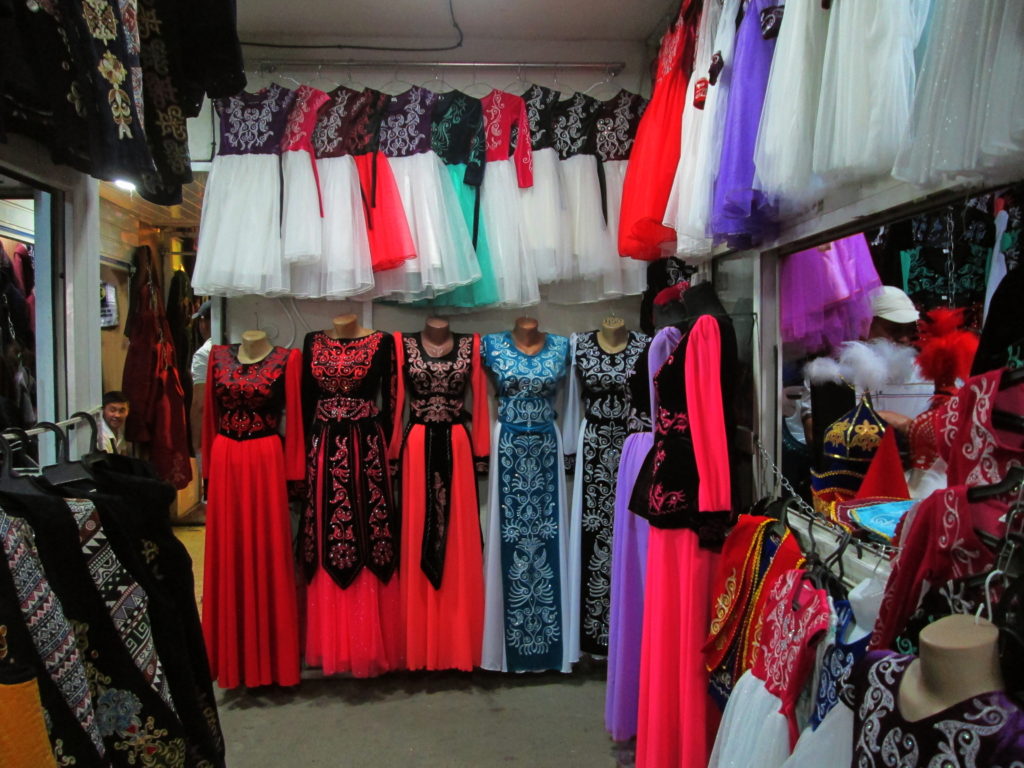
Next, I went with two of my language partners (during our free time) to Dordoi Bazaar, a conglomeration of several independent markets that stretches for over a kilometer on the outskirts of Bishkek. Dordoi Bazaar is better organized than Osh Bazaar. Each store is labeled with a number and each aisle is similarly labeled. In addition, the bazaar is divided into sections based on type of item sold as well as place of origin of item. We spent several hours there and only covered a fraction of the bazaar during our time there.
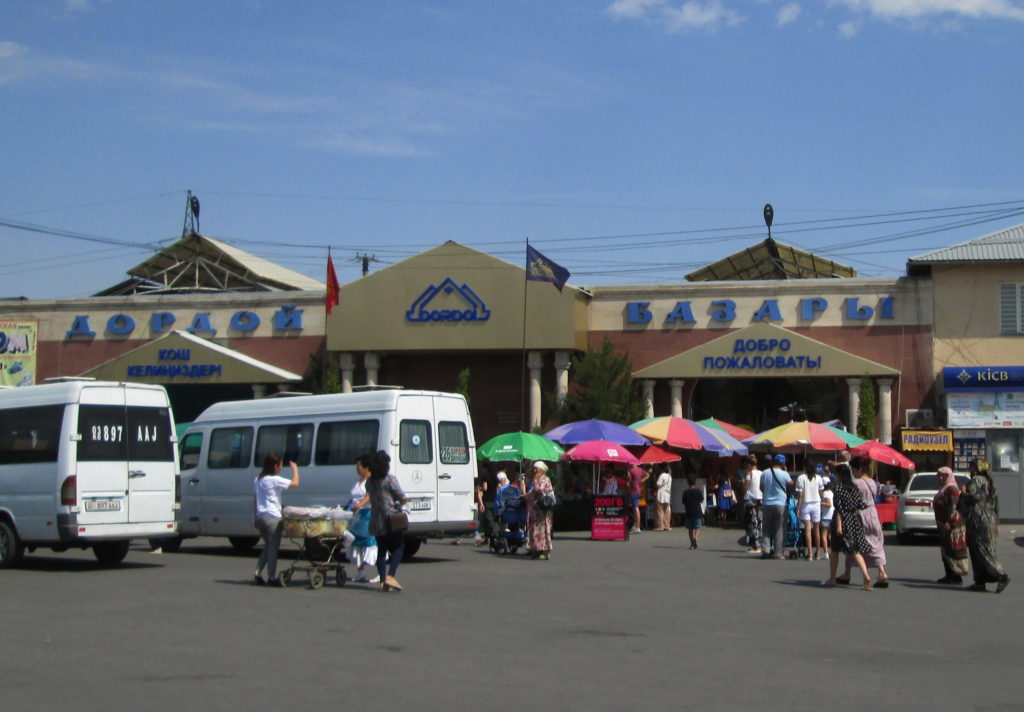
While there, I was very thankful to have two native Russian/Kyrgyz speakers with me, but also often frustrated. They could speak with the store vendors and explain to them exactly what I wanted, switching to Kyrgyz tow communicate with some of the older vendors. I kept forgetting the words for things like ‘vest’ and ‘velvet’ and ‘design’ and so it was helpful to be able to point to something that I liked and then have the language partner understand my meaning and speak for me to the vendor.
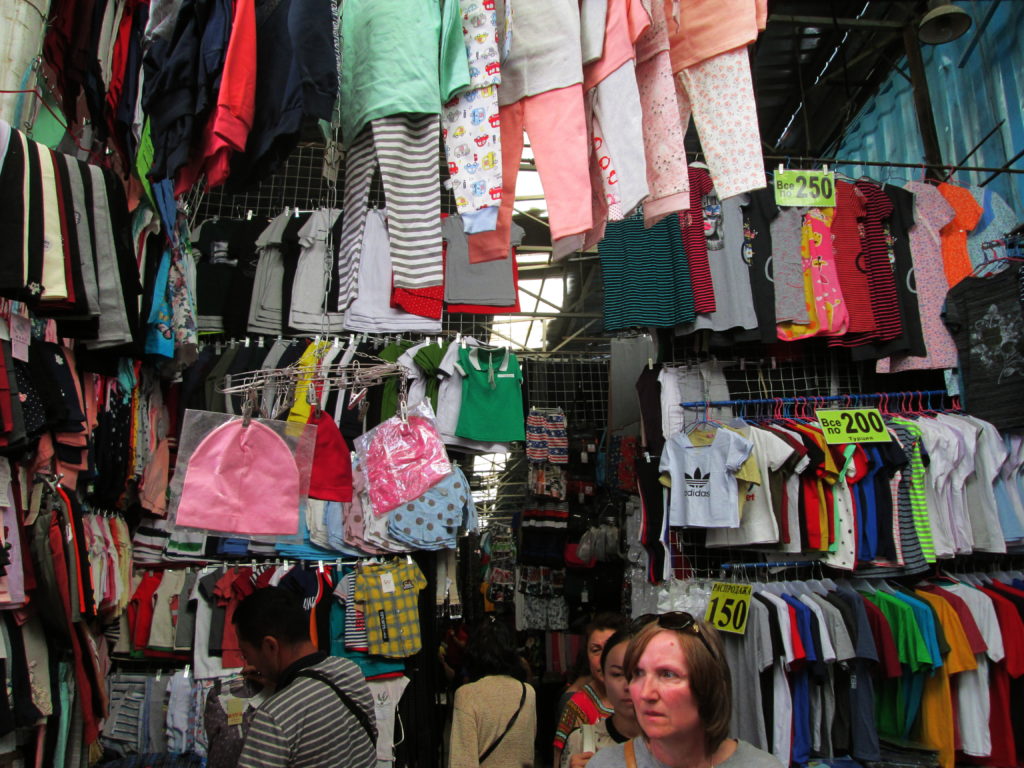
However, when I felt awkward that they were going to so much trouble to find a vest that fit all my criteria, I found myself at a loss as to how to tactfully tell them that I wanted to give up on buying anything and just wander around the bazaar. One of the language partners mumbled so that I could barely understand her and the other was very quiet and difficult to talk to. So, in the end I ended up buying a vest that I didn’t really want and then going home because I was too awkward to tell them that I just wanted to wander around. Granted, that probably could have happened even if I was with native English speakers in America–I trust myself to be that awkward–but the language barrier made it just a little to hard and awkward for me to force myself to deal with it.
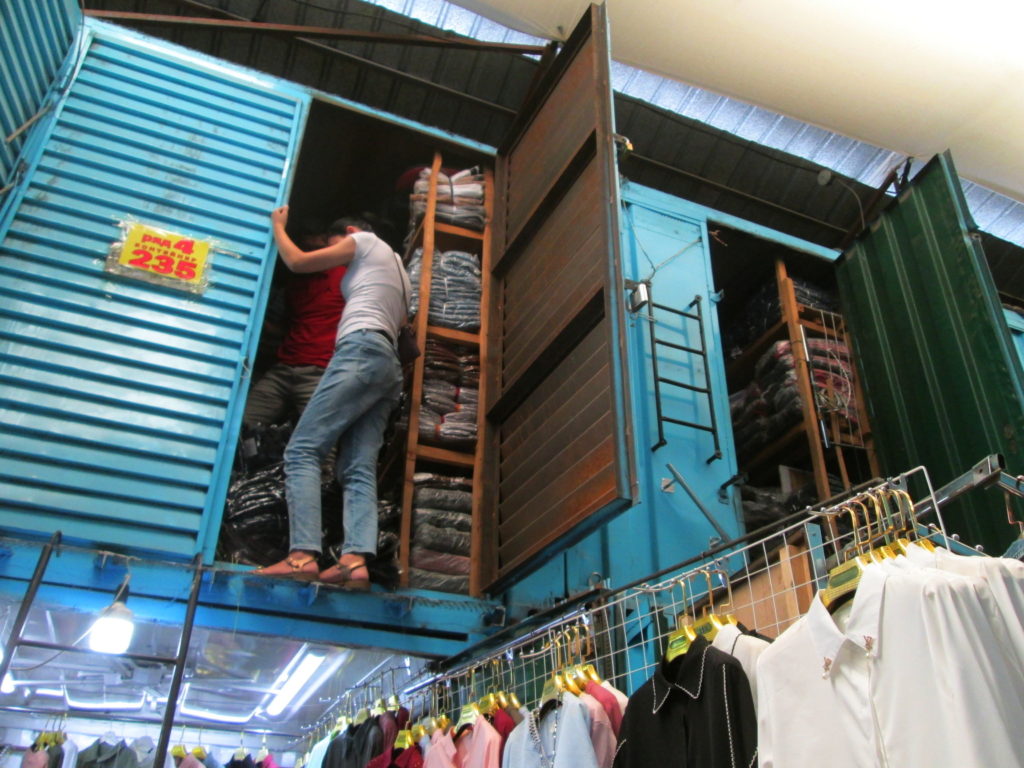
But they got me a good price on the vest, which was cool. Even though I didn’t ask them to bargain for me, they did it automatically. They made sad faces and acted like the vest wasn’t the best thing ever and got the vendor to lower the price a few hundred som (68 som = 1 dollar). I guess to the Kyrgyz it is so obvious that you need to bargain that they did it for me without even asking. For me, the hardest part of bargaining is not the language barrier, it’s the cultural difference: it seems to me to be very rude to ask for a lower price, as though I wasn’t happy with the product and wanted to hurt the seller financially. So the real challenge in getting a bargain was making myself think like a Kyrgyz, not just speaking like one. And, of course, the bargaining took place in Kyrgyz, not Russian.
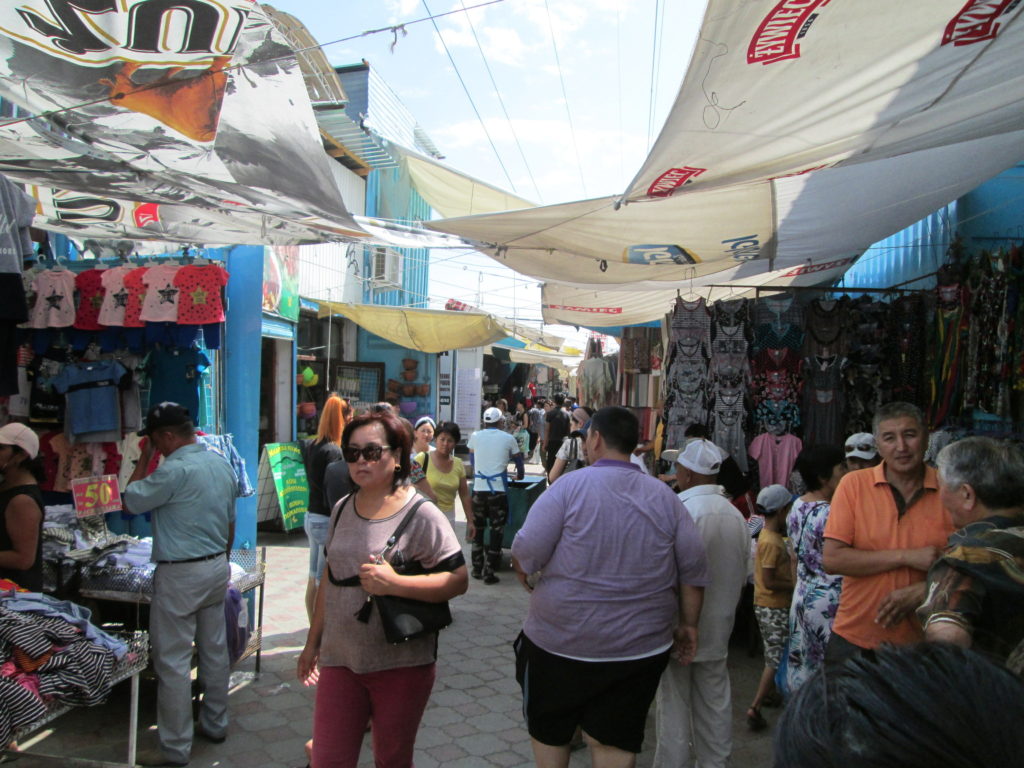
I have to point out that it always surprises me whenever I see the people around me switching so smoothly between Russian and Kyrgyz. About 50% of the people in Kyrgyzstan speak Russian, and almost everyone that lives in Bishkek speaks both Russian and Kyrgyz. Russian is taught in all the schools in Bishkek, and most native Kyrgyz speak Kyrgyz at home. On peer tutor told me that the Kyrgyz speak Russian more accurately than native Russians do because they take classes on Russian throughout their school career. All university classes are taught in Russian. In America I’ve met almost no bilinguals, and the ones that I have usually only speak English around me. Here, the bilingual Kyrgyz switch between a language that I half-understand to a language that I don’t understand at all, and it’s both interesting and intimidating. It’s also frustrating, since it means that I sometimes can’t practice my Russian language skills because the people I’m listening to have switched into Kyrgyz. For instance, the bargaining for the price of the vest took place in very quick Kyrgyz, and then they told me the new price in Russian. Therefore, I wasn’t able to practice my own Russian language skills, either in speaking or listening. But, I suppose when it comes to money and getting a good deal, it’s best to do it in the preferred language of commerce and lay aside educational concerns for a minute. Anyway, I was able to practice a lot of my clothing and buying/selling vocabulary, and I certainly practiced my numbers a lot!
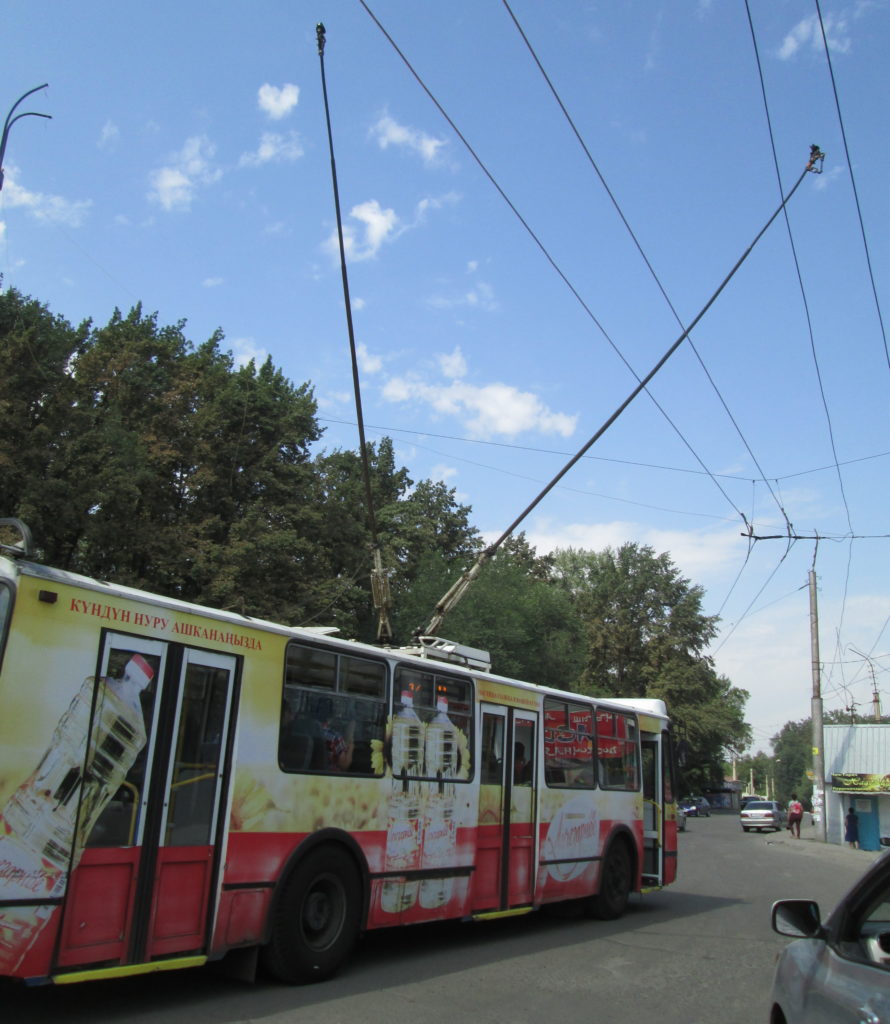
A few weeks later I went to Dordoi Bazaar again, this time with two different language partners that spoke very clearly and were social and open. The experience was much better this time, as I was able to explain that, while I wanted to buy some new sneakers, I also just wanted to wander around. There was an entire aisle at least several hundred feet long full of shoe vendors. They asked me what my budget was and I told them 2000 som. We wandered into a few ‘stores’, tried on some shoes, asked prices, and then finally bought a pair of sneakers. Again, the language partners bargained for me, this time loudly saying something in Kyrgyz that I assume was something like, “Please, baike, 2000 som!” At least, I heard ‘baike‘ (байке) a lot, which is the Kyrgyz equivalent for ‘mister’.
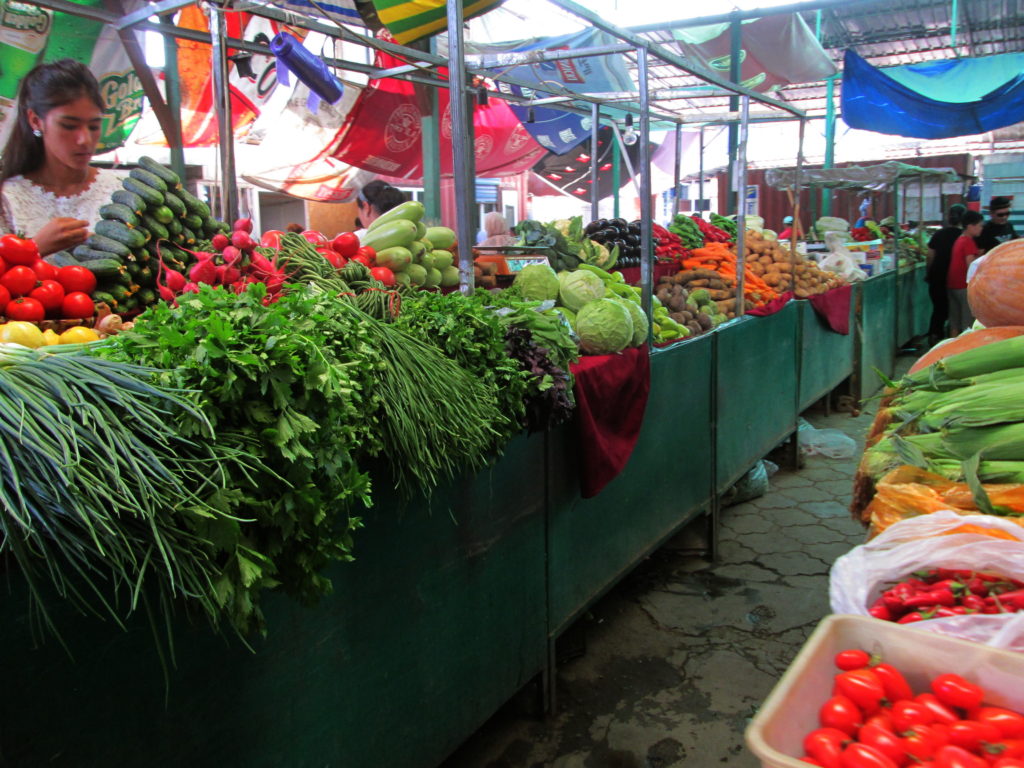
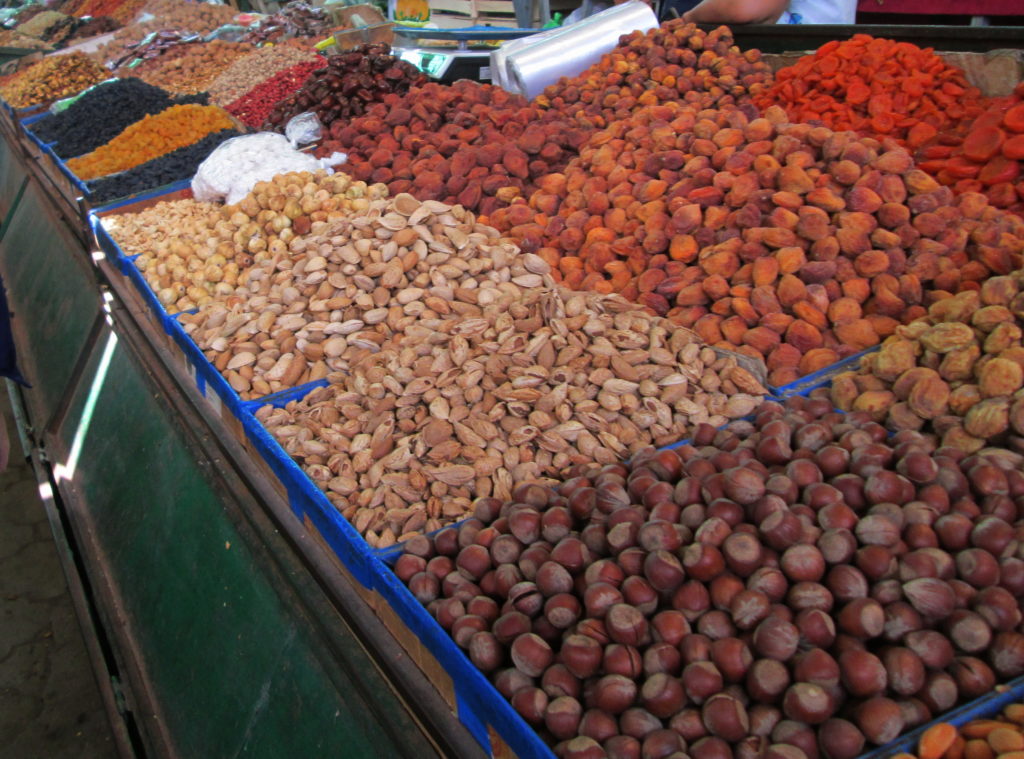
After that we wandered the aisles and stores. They took me to the food section, an ‘everything for 50 som’ store, and the clothing section. Then we wandered around a bit more because we couldn’t find the marshrutkas (public vans) that would take us home. Both of the language partners were quite familiar with the layout of Dordoi. One said that she didn’t like it because it was so large and busy. However, to me it seemed strange that the high-priced malls could stay in business when the bazaars sold the same items for a third of the price. They told me that its because the stores are quieter, you can browse at your leisure, they have the newest styles, and you can be sure of the quality of the items that you are buying. I suppose that there’s also economic and even moral implications to shopping at the bazaar: you are supporting local commerce, but also work-shop labor in China, since most of the items sold in the bazaar are so cheap because they come from China.
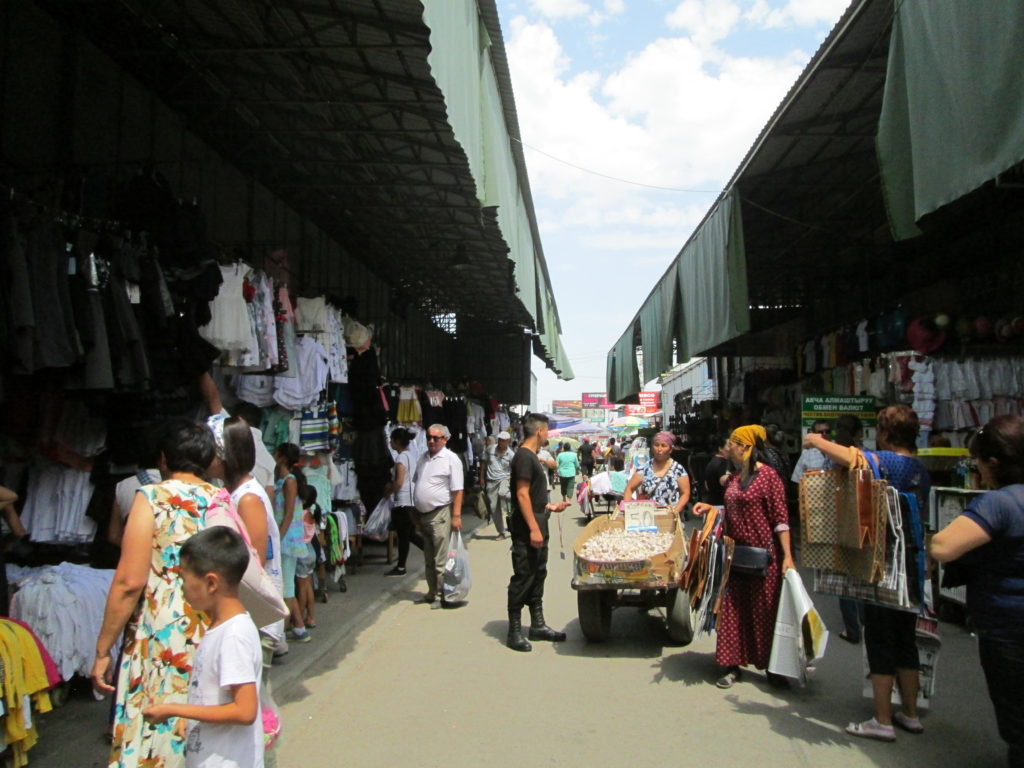
Anyway, overall it was an amazing experience. I was able to chat with the language partners, read the signs, understand the prices, and speak with the vendors if I wanted to. And, of course, buy something nice for a good price. I also learned a few new words in Kyrgyz, such as ‘жол‘ (jol) which means ‘road’ and is what the men pulling carts full of goods yell as they run through the narrow aisles of the bazaar, since the carts are so heavy that they can’t possibly stop. I was also able to solidify food vocabulary, such as the names of different fruits, and also learned the words for several different kinds of traditional Kyrgyz snacks which people sold from carts in the aisles, such as samsi, kurut, and nan.
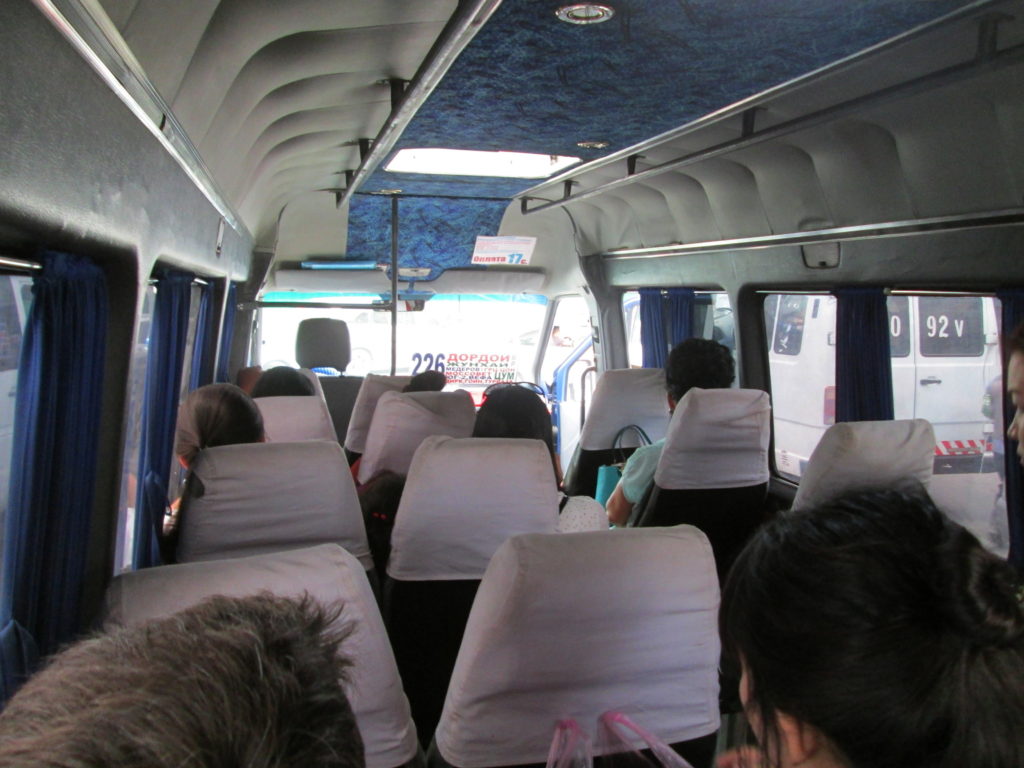
If you are ever in Central Asia, be sure to visit a bazaar! If you’re in a former Soviet country then you will be able to use the vocabulary below to help you get a good price!
General shopping phrases:
- How much does it cost?
- Сколько стоит (это)? – Skolka stoit (eta)? (with your voice raised on the first ‘o’ in ‘skolka‘)
- The ‘это‘ (eta) is optional, and if included, accompanied by you pointing at the item in question. You can also point without using this word, or even just say ‘Сколько?’ (Skolka), as the rest of the sentence is implied by the situation. You can also replace ‘это‘ (eta) with the name of the item if you know it in Russian (remember, it’s in accusative case!))
- Tell me, please
- Скажите мне, пожалуйста, – Skazhitye mnye, pazhaluista (the ‘zh’ is pronounced like the ‘s’ in ‘pleasure’)
- Excuse me, please
- Извините, пожалуйста – Izvinitye, pozhaluista
The most important phrase:
- Make me a sale, please.
- Сделаете мне скидку, пожалуйста. – Sdelayetye mnye skidky pozhaluista.
- After this, they might offer a new price or ask you to name your own new price. My Kyrgyz friends recommended suggesting 75% of the original price.
- How expensive!
- Как дорого! – Kak doraga!
- Usually, you can get an item for 75% of the original price. I was able to get a 1500 som dress ($22.50) for 1200 som ($18) (20% less), an 800 som ($12) vest for 600 som ($9) (25% less), and 2400 ($36) sneakers for 2000 ($30) (16% less). If you have actual bargaining skills, you can probably get an even better price!
After the sale:
- Thank you
- Спасибо вам– Spasiba vam
Kyrgyzstan-only vocabulary:
- Miss/Missus (literally: older sister)
- эже – eje (with a hard ‘j’ like in ‘jar’)
- Mister (literally: older brother)
- байке – baike
- Thank you
- Рахмeт – Rakhmet (the ‘kh’ is pronounced like the ‘ch’ in ‘Bach’ or ‘loch’)
